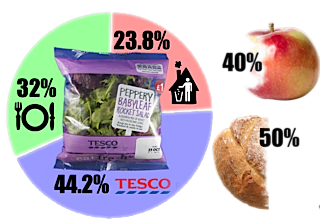
An EU-specific target on food waste reduction has been removed from the new Circular Economy Package. The Commission say they are committed to helping Member States reach the Sustainable Development Goals on food waste reduction, but this target is weaker, as is the methodology behind it.
ARC2020 joined with a number of other organisations in criticising this softening of ambition.
Specifically we and our co-signatories proposed the following recommendations. These would result in robust action on food waste within the Circular Economy Package:
- Re-introduction of an EU-specific food waste reduction target of at least 30%, and accounting for food waste over the full supply chain
- Inclusion of farm-to-fork food waste measurement, including pre-farm gate waste, with a roadmap for bringing in targets for pre-farm gate waste by 2020
- Embedding of the Food Waste Hierarchy in all food waste reduction measures and allowing diversion of food waste to livestock feed
Read full position paper on food waste and circular economy

Agriculture Ministers will adopt conclusions on food waste in June, so we will keep you informed on key times you can use to lobby your government on their position on food waste.
Background
In December the EU Commission announced a Circular Economy Package. Like everything else these days it seems, this is about jobs growth and competitiveness.
“The proposed actions will contribute to “closing the loop” of product lifecycles through greater recycling and re-use, and bring benefits for both the environment and the economy. The plans will extract the maximum value and use from all raw materials, products and waste, fostering energy savings and reducing Green House Gas emissions.
The proposals cover the full lifecycle: from production and consumption to waste management and the market for secondary raw materials” the Commission reported.
On paper the targets for waste look impressive:
- A common EU target for recycling 65% of municipal waste by 2030;
- A common EU target for recycling 75% of packaging waste by 2030;
- A binding landfill target to reduce landfill to maximum of 10% of all waste by 2030;
- A ban on landfilling of separately collected waste;
- Promotion of economic instruments to discourage landfilling ;
- Simplified and improved definitions and harmonised calculation methods for recycling rates throughout the EU;
- Concrete measures to promote re-use and stimulate industrial symbiosis –turning one industry’s by-product into another industry’s raw material;
- Economic incentives for producers to put greener products on the market and support recovery and recycling schemes (e.g. for packaging, batteries, electric and electronic equipment, vehicles).
But in practice, this represents a watering down of targets, after much time wasting.
As the EU Parliament’s magazine reported regarding the EU target for recycling 65 per cent of municipal waste “former Commission President Jose Manuel Barroso’s team wanted to introduce a 70 per cent target in 2014.”
MEPs from across the political spectrum lined up to critique – or, at least, give muted responses to – the announcement.
“EPP deputy Karl-Heinz Florenz asked whether the proposal was “much ado about nothing.”
ALDE group shadow rapporteur on the circular economy, Gerben Jan Gerbrandy accused the Commission of “wasting months of work and many hours of parliamentary time. With a weakened waste proposal and an action plan copy-pasted from the 2010 roadmap to a resource efficient Europe, it’s clear the European Commission is failing to deliver on this important agenda for growth and jobs.”
ALDE’s Catherine Bearder, added; “The only ambition shown here is for weakening targets.”
Greens/EFA group Vice-Chair Bas Eickhout commented; “While we welcome the fact that the Commission has finally come forward with revised proposals on the circular economy, we are concerned that the plans are undermined by the reduced ambition. This is contrary to the commitment by the Commission for a more ambitious proposal. A year on from the initial decision by the Commission to withdraw its original proposals, we have lost both time and ambition in the push to stimulate the circular economy at EU level.”






just to say scottish government announced 33% food waste reduction target last week http://news.scotland.gov.uk/News/Make-things-last-and-save-22da.aspx